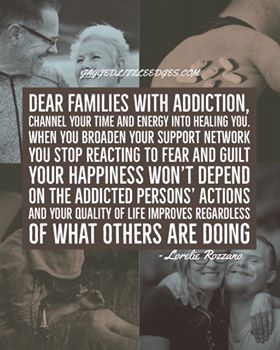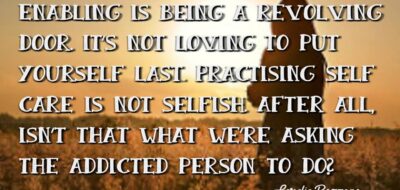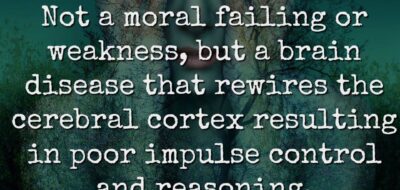
Addiction is an ugly disease that appears unseeing, unhearing, uncaring and unloving. You’ve probably talked to your loved one about getting clean/sober until you’re blue in the face. But you can’t seem to break through their enormous wall of denial.
You’ve racked your brain trying to come up with the right words. You‘ve rehearsed it in your mind only to have it backfire on you. Instead of helping, your addicted loved one accuses you of not caring enough. You wonder, is there anything you can say or do to reach them?
While there are no magical words that will instantly restore the stranger in front of you to their former self, there are some things you can do and say that will help.
1) Join a support group.
Because your sick loved one is unable to meet your emotional needs, it’s important to find safe and healthy people you can share your feelings with. All too often the addicted person’s family hides their emotions, hoping to avoid confrontation. Many believe if they say the wrong thing to their addict, it will cause them to use. But feelings don’t always stay hidden, sometimes they come out with an angry bang. Words spoken in anger are often harsh, mean and vindictive. This results in guilt and remorse followed by more enabling behaviors.
2) Talk to your support group before you talk with your addicted loved one.
We all need people we can share our emotions, laughter, tears, hugs, plans, and dreams with. If you’ve got something important, you need to say to your sick loved one, debrief your intentions with your support group beforehand. Addiction is a life and death matter. Your best approach is a cool, calm head.
3) Empower your conversations with “I” statements.
Instead of using shaming or blaming words- change your language. No one likes to be reminded of their failures, and those who are addicted are already loaded with shame. Raking them over the coals one more time just gives them more reason to use. Don’t point the finger. Instead of saying “you need to (fill in the blank).” Use “I” statements. I statements communicate your needs and feelings without judging the other person’s behavior. Example: This is really hard for me. I love you, and I’m scared. I want to help you, but I don’t know how.
4) Set the stage for an open conversation.
Let them talk. It doesn’t matter if you like what they’re saying or not. Take your emotions out of it. Listen to understand, not to argue. Hear what they’re telling you. The person you love may be sicker than you think. By listening you can assess what kind of help they need. Do they need drug and alcohol treatment? Do they need psychiatric help? Do they need both? Are they able to understand the severity of their illness? These are all important factors when considering help.
5) Understand the person you love is not themselves.
Nothing is as painful as loving someone who would rather get high than spend time with you. You may still view the person you love as who they once were, but they’re not that person anymore. Their brain has undergone profound changes that affect their impulse control and reasoning. They have a progressive, terminal disease. Be prepared to do everything in your power to fight it while maintaining a healthy relationship with yourself, your family and the addicted person in your life.
6) Set boundaries.
Setting boundaries create healthy relationships. It lets the addicted person know what’s okay and what isn’t. Boundaries say ‘I won’t be manipulated.’ Boundaries are not walls. They keep you from getting sick but are not meant to be rigid. Work on maintaining boundaries that are strong enough to protect you but flexible enough to allow healthy connections to others. This is key to physical, mental, emotional and spiritual health.
7) Know the addicted person is not the only one who needs to make changes.
Hiding your pain only intensifies it. Addiction thrives in secrecy and isolation. Don’t let shame write your story. Rip off the mask. With the right education and support, you will promote a powerful message: I walk my talk. Being negative, secretive and ashamed only makes a difficult journey, more difficult. Instead, be transparent. Open up to safe and supportive people. Find your tribe. Understand that although you love the addicted person in your family, your emotional needs will not be met with them.
The best way to love someone struggling with addiction is to stop engaging in power struggles. As the old saying goes, “nothing changes if nothing changes.” Instead of arguing, walk away- but don’t give up. Bring in reinforcements. Remember, they are not purposely being defiant. The person you love is sick and delusional. They’re more afraid of going without drugs/alcohol than of dying from their disease.
Don’t wait for your loved one to change. Lead the way! Addicted persons are most successful when they’re families are educated and in recovery too
Lorelie Rozzano
www.jaggedlittleedges.com






Laura Lutz
I’ve been through everything you write!! Every word is so true. I need to read your books. Where do I start, Amazon?
Lorelie
Hi Laura,
You can find the Jagged books on Amazon.
Best wishes!